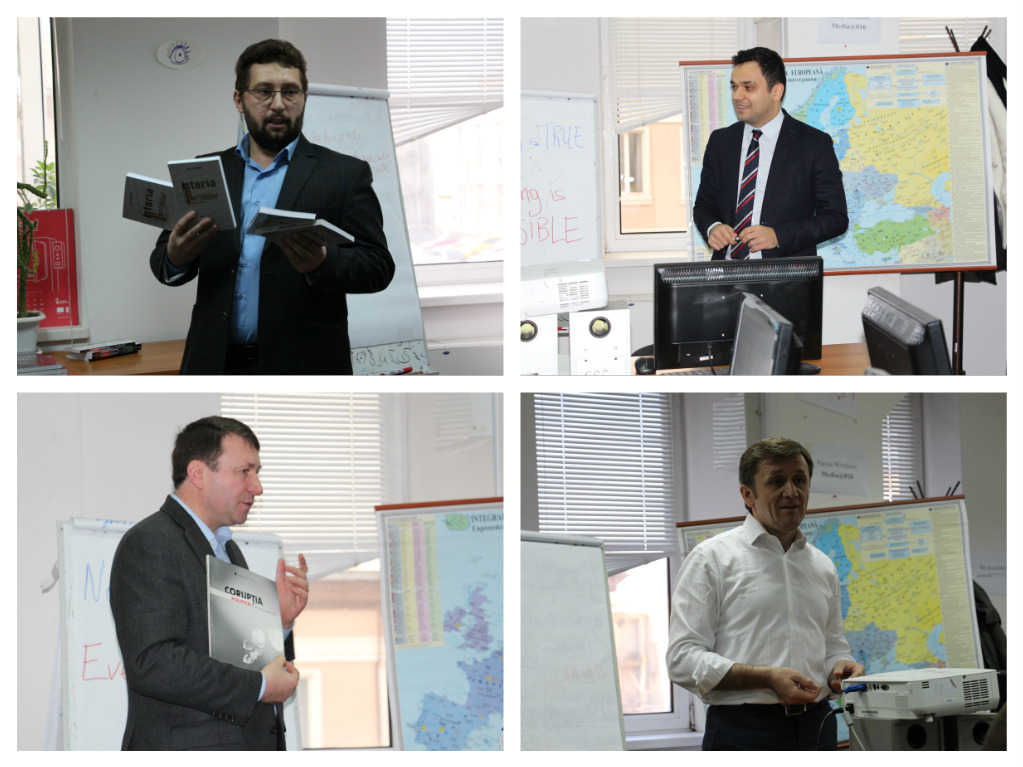“Political week” at the SAJ: Valuable guests and heated debates

The week of February 22-26 at the School of Advanced Journalism was intense. The second module of the course on political journalism, run by trainer Alina Turcanu, senior editor of Radio Free Europe, brought new challenges to students (how to successfully approach political realities, how to read politicians’ statements through the lines, etc.), as well as new guests. They presented their views on the political situation in Moldova and answered future journalists’ questions.
Igor Volnitchi: “I’ve never seen parties that don’t lie”
The guest on the first day of the course was Igor Volnitchi, political adviser, former spokesman for Prime Minister Vlad Filat, and author of several publications, including the book “History of Parties (1991-2014)”. He spoke to SAJ students about the evolution of parties and political system in Moldova, as well as about the hidden interests of current political actors. According to the guest, our country’s political system allows parties to act as businesses, which need to come to power in order to feel safe.
“I’ve never seen parties that don’t lie,” Igor Volnitchi said, advising future journalists to identify “veiled” messages in politicians’ speeches and never lose professional vigilance in relations with them when they get to work in media outlets. Also, speaking from his own experience as a journalist, analyst and writer, he advised young people to read more, to carefully study any information that is offered to them, and to do their research before going to events. “If you are not properly prepared, you can be easily lied to and used by politicians,” Igor Volnitchi said.
On the same day, SAJ students met with David-Gabriel Puie, political officer of the European Union Delegation in Chisinau. He reminded, by mentioning relevant figures, that the European Union is still a leader in the external assistance offered to our country, and the aid offered by European countries goes equally for budgetary support, technical assistance, justice sector reform, development of the energy infrastructure, transport, good governance, education, economy, and civil society. At political level, successes of cooperation included visa liberalization in April 2014, followed by signing of the Association Agreement and start in the application of provisions on the Free Trade Area.
Igor Munteanu: “For a journalist, public recognition is more important than a bank account”
Discussion with Igor Munteanu, director of IDIS “Viitorul” and former ambassador in the United States of America, focused on the political situation in Moldova, which “held and still holds in suspense not only Moldovan citizens, but also external partners,” on the need to make political policies a priority, and on some international phenomena. In his opinion, the fight for absolute power in the country continues and no one knows what will happen in the nearest future, because political parties in our country act as “pressure groups, whose goal is to accede to power.” When asked whether early elections could become a “life buoy” for Moldova, Igor Munteanu said he does not see them as a solution. “To get out of the crisis, the current government should focus on several main goals: setting very strict conditions for all political forces, rigid monitoring of public institutions and public money, and, not least of all, cleaning the political system of parasites,” Igor Munteanu said.
In this context, student Iurii Botnarenco asked the guest why competent people don’t come into politics. “They don’t want to become anyone’s puppets,” was the answer. Future journalists also asked questions about presidential elections, reform in the justice sector and in other areas, political leaders, referendum, civil society and its role in changing the country’s political vector. As for the role of journalism in covering political topics, Igor Munteanu thought that every journalist must be fair, neutral, impartial and independent in their work: “A journalist’s values and public recognition are more important than a bank account.”
Iurie Ciocan: “Deontology begins in our spirit”
About elections and election campaigns, SAJ students discussed with the third guest of the week – Iurie Ciocan, chairman of the Central Electoral Commission (CEC). Questions for him were very diverse: early elections, referendum, organization procedures, costs, political alternatives, electoral threshold, etc. An important accent was put on the role of the media in covering election campaigns. Iurie Ciocan drew attention to the fact that during elections the role of the media is to educate voters. “The media must educate voters, providing them with true and fair information, and thus be a part of society,” CEC chairman underlined.
Advertising and manipulation in election campaigns were two other topics that sparked heated discussion at the SAJ. In Iurie Ciocan’s opinion, the media should cover events fairly, neutrally and impartially. He also believes and that “deontology begins in our spirit, and journalists should have a critical spirit, appeal to several sources, and never express their opinion.” Iurie Ciocan also spoke about violations that occurred in various election campaigns, which became known only due to active involvement of the media.
